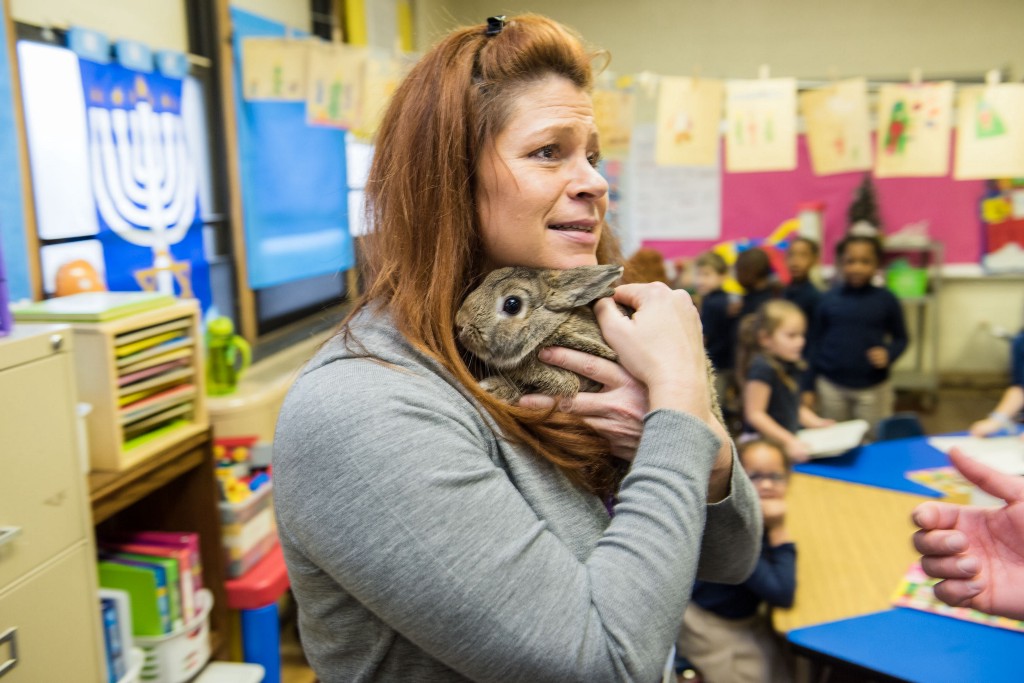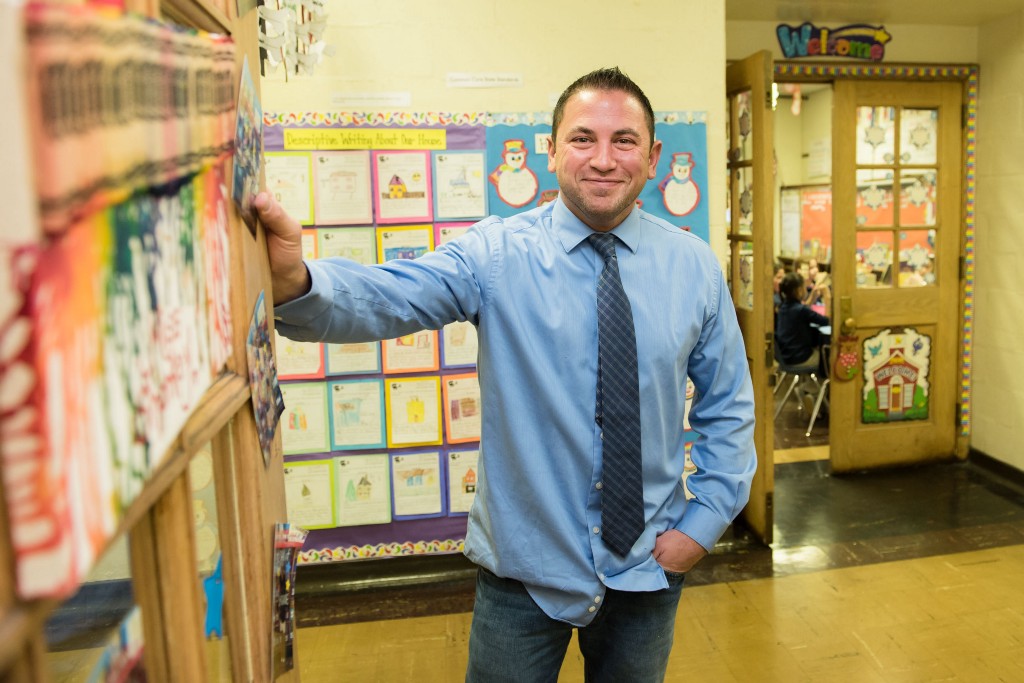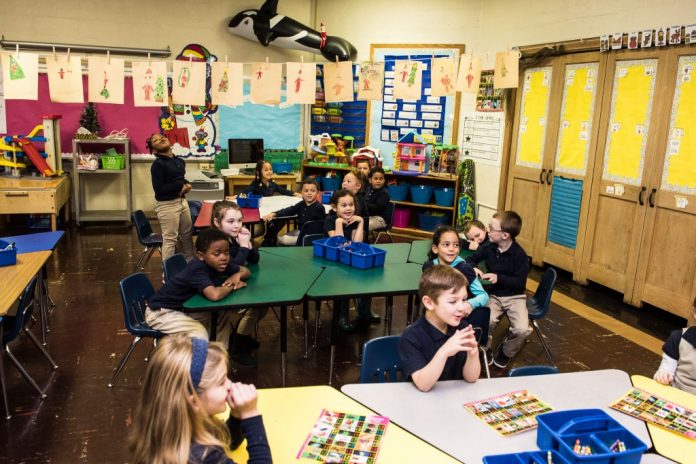MARIA S. YOUNG / TIMES PHOTO
Most people who arrive at Fox Chase Elementary School see a scene typical of many Northeast Philadelphia neighborhoods.
The venerable two-story brick public school stands guard over the intersection of Rhawn and Ridgeway streets, tucked between rows of neatly-kept twin homes on one side and expansive singles on the other. In back, the school has acres of pavement for parking, a lot that blends almost seamlessly into the sprawling Fox Chase Recreation Center, with its basketball, street hockey and tennis courts, its baseball and soccer fields and its community gymnasium.
But Principal Rob Caroselli and a dedicated team of Fox Chase Elementary faculty have a different vision of their beloved neighborhood school. They view it much like a farm, where the curriculum is the earth, inspiration is the seed and hard work is the sun and water necessary for their plantings to flourish within almost 500 young learners.
Moving forward, the agricultural theme will represent more than metaphor. Earlier this month, the School District of Philadelphia announced that Fox Chase Elementary had been approved for the district’s School Redesign Initiative, a designation that will allow the school to advance an agriculture-themed, project-based curriculum that will transcend all core subjects.
Caroselli hopes that the new vision will enhance the school’s attractiveness to prospective students and their parents, while strengthening its status as a neighborhood institution and its partnerships with the community.
“Not only is this going to help us teach, it’s going to help us bring in resources,” said Kate Grugan, an ESOL teacher who led the team that authored the school’s redesign proposal.
“Agriculture is the largest industry in the state. It’s not just about going into a field, planting and harvesting. It’s engaging,” Caroselli said. “It’s not just stand and deliver instruction. It’s hands-on.”
The school district official who oversees the School Redesign Initiative did not respond to a request for comment about the program, but the district hosts a website containing some specifics:
The district “invites educators and stakeholders with a talent and passion for school improvement to submit a ‘school redesign’ proposal that draws on innovative, research-based practices shown to improve educational outcomes for all students,” the website states. “Exceptional applicants that are able to put forth innovative ideas for how to engage all students in learning for the 21st century — as well as to demonstrate a commitment to the school community, a history of successful leaderships and strong instructional expertise — will be given the opportunity to lead the implementation of the school redesign beginning in the fall of 2016.”
Caroselli characterized the initiative as an effort by the district to develop new instructional models from the grassroots level. Previously, the district approved applications by Tilden Middle School, J.S. Jenks Academy for the Arts and Sciences, Arthur Elementary and Carnell Elementary. In a second wave, the district approved Fox Chase, along with Hancock Middle School-LaBrum Campus and Penrose Elementary. Each school is eligible for $30,000 in grant money to underwrite professional development activities for faculty. The redesign status also gives each school leverage to apply for additional third-party grants.
But the initiative is mainly about ideas. Fox Chase was the only school approved for an agriculture-based learning redesign. It will become the city’s only public grade school with permanent agricultural programming. Fox Chase serves about 490 students in kindergarten through fifth grade.
One existing Philadelphia magnet school, Roxborough’s Saul High School of Agriculture Sciences, operates with a full agricultural curriculum. Abraham Lincoln High School, the neighborhood high school in Mayfair, has a horticultural program while Swenson Arts and Technology High School, a vocational school in the Far Northeast, has an agricultural program.
According to Caroselli, Fox Chase Elementary has already been doing well even without a redesign. Enrollment has grown by about 40 since last year. The school has been filling its kindergarten classes with new enrollees from the school’s traditional catchment area, which means that more families from Fox Chase are sending their young learners to the neighborhood school, rather than seeking alternatives. Caroselli’s own child attends the school.
Grugan recalled that enrollment was in the mid-300s when she began teaching at Fox Chase about a decade ago. Caroselli said that enrollment is close to maximum capacity.
Conversely, the connection to agriculture is a relatively new development at the school. It began last school year when Caroselli invited Mandy Fellouzis, the agricultural teacher at Fox Chase Farm, to visit the elementary school and speak to students — sort of a cross between guest lecture and show-and-tell.
Fox Chase Farm is a city-owned, school district-run farm on Pine Road, less than a five-minute drive from the Fox Chase Elementary campus. It is one of two working farms in the city (the other being the one at Saul High School).
“The very first day (Fellouzis) came, I was in a classroom with her and I saw every kid — those with behavior problems, those with special needs and high-performing students — they all were engaged,” Caroselli said.
The collaboration between the elementary school and farm grew to include visits by student groups to the farm. Last March, Fellouzis returned to the school with some friends, including a 3-day-old calf, a 6-week-old lamb and a cubicle full of fuzzy yellow baby chicks.
The redesign concept grew from that collaboration. The project is not to be maligned as a glorified petting zoo, however. On the contrary, it’s based on modern, tested educational theory and practice. It will include field trips, guest visits and ongoing projects such as an on-campus greenhouse and agriculture lab. Agriculture as an industry incorporates principles of and offers valuable potential lessons in science, math, social studies, health and other core subjects.
“We’re moving to project-based learning. It’s a shift going on in education that we want to be a part of,” Grugan said.
“Just (recently) we took a group of students out to Lancaster and visited a family-operated farm. They saw the business side of agriculture and career opportunities,” Caroselli said.
Lessons can be modeled for students on a college-bound track and those who may prefer vocational education in high school and beyond. They will promote inclusiveness for all types of learners and teamwork. And they will be applicable to other fields, even if the student has no interest in pursuing agriculture as a career.
The transition won’t happen overnight. Fox Chase’s redesign team is just now formalizing its projected timeline for implementing dozens of components in the project, objectives that the school district calls “deliverables.”
“It’s a process, implementing it into the curriculum,” Caroselli said.
“It’s our goal within three years to have a full integrated curriculum,” Grugan added. “It’s a big change for all of us.” ••

Fox Chase Elementary kindergarten teacher Colleen Durkin holds her classroom pet. MARIA S. YOUNG / TIMES PHOTO

Planting the seed: Fox Chase Elementary principal Rob Caroselli explains how agriculture offers valuable lessons in science, math, social studies, health and other core subjects. MARIA S. YOUNG / TIMES PHOTO





